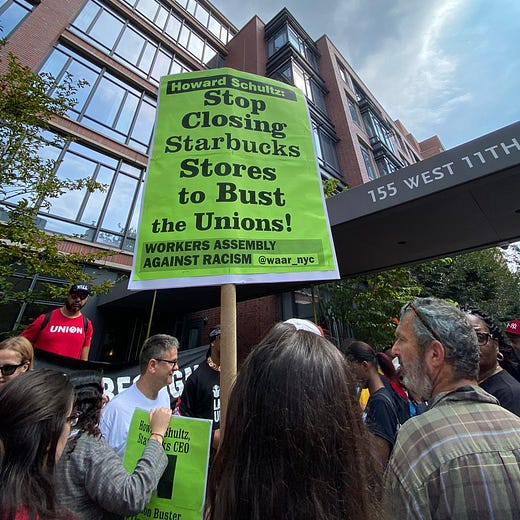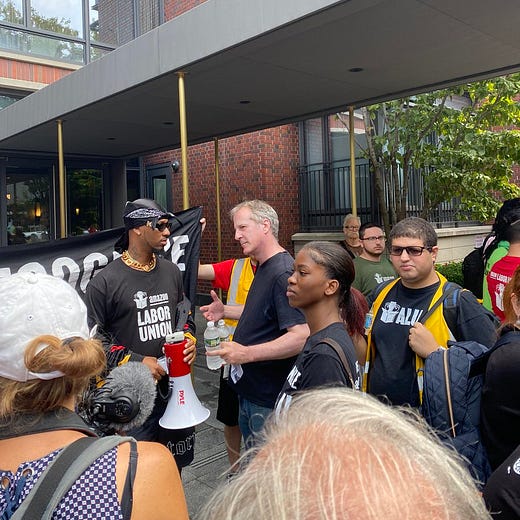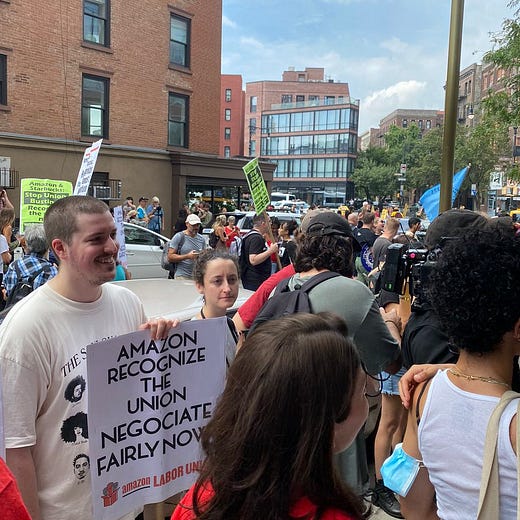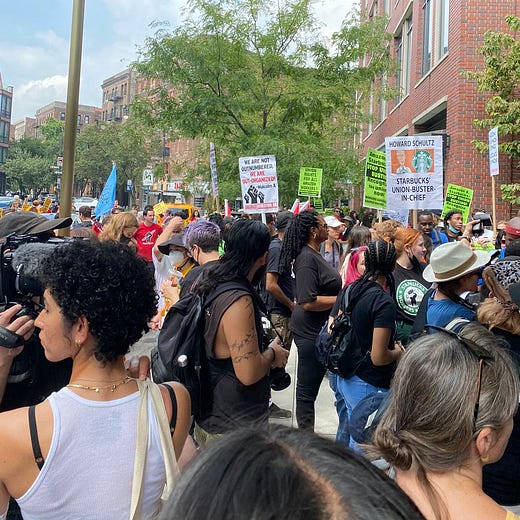Solidarity and smart politics
Plus, some ~personal news~
Welcome to a Labor Day edition of Progress Report.
I’ll start off with the rare bit of personal news: After a comically long (but thankfully uneventful) nine months, my wife and I are expecting our first child sometime near the end of September. The official due date is on the 27th, but as has been emphasized by both our doctors (who have been great!) and the slightly unsettling videos that the hospital sends out to expecting parents, once a pregnancy gets to this point, any time could suddenly become go-time.
Having a baby just a little over a month before the midterm elections is not the most convenient timing, but I’m hardly going to complain. As much as I’m working to prep ahead of time, the newsletter may go dark for a week or so once the baby is born. But his imminent arrival is also providing the impetus for a serious expansion of our newsletter family.
For the past month, I’ve been working to recruit new writers, reporters, and activists to contribute to Progress Report this fall. The future of both American democracy and who controls its levers of economic power will be decided in pivotal state and local elections all across the country, and as a result of this past month of recruiting, we will have eyes and ears on the ground, reporting the stories and nuances that you won’t find in the national media (especially not at CNN).
I’ll still be writing at least one newsletter per week, and Natalie Meltzer will continue her excellent weekly contributions, so these new reporters will be increasing the scope of the newsletter instead of simply filling in a void. It’s an exciting time, with plenty of excellent stories already in the works. Expansion is not a cheap endeavor, though, so now would be a perfect time to become a premium subscriber here at Progress Report. Doing so will help fund our growing reporting and ensure you get all the stories right in your inbox.
In today’s newsletter, I’m taking you to the hot, crowded streets of Manhattan, where workers and activists gathered to mark the first Labor Day of this new era of organizing and flex the growing political power of a working class that’s no longer willing to stay quiet.
Thank you to our latest crowd-funding donors: Kate, Bruce, Jim, and Patricia!
I’m writing this after spending much of the afternoon with an assembly of activists that have helped to reinvigorate the movement that was once powerful enough to command its own federal holiday. Appropriately, we began down in the parts of Manhattan that long ago transformed from working-class neighborhoods to the spotless provinces of condos occupied by local multimillionaires and pied-a-tiers owned by out-of-town billionaires.
The event was organized by the principal leaders of the Amazon Labor Union and members of Starbucks Workers United, two of the organizations that have injected new life into the labor movement. On Monday, they sought to inject life into the parts of the city now reserved for the sorts of people that prospered off labor’s decline.
It kicked off with a rally outside a West Village building where Starbucks CEO Howard Schultz keeps a duplex that he bought for $40.4 million all the way back in 2017.
The building is one of those mid-rise residential towers that obviously caters to wealthy tenants, but doesn’t immediately announce itself as the full-service oasis that a billionaire might find acceptable for when they’re not at their estate or on their super yacht.
That is a feature of city real estate, not a bug. The beauty of New York for people like Howard Schultz is that unless they live in a giant brownstone nestled on a quiet side street in Greenwich Village or one of the remaining mansions overlooking Central Park, it’s somewhat easy to remain anonymous. The beauty of the city for the rest of us is that virtually everywhere is a public space, so once someone like Howard Schultz ticks off enough people, there’s nothing to stop an assembly of protestors from posting up on his sidewalk and drawing all kinds of unwanted attention.
Amazon Labor Union interim president Chris Smalls led the march and played both emcee and keynote speaker at each of the stops. His sheer presence and the power of his personality made it inevitable and logical that the Amazon antagonist would run the show, even at Schultz’s building. There was no tension there; Starbucks Workers United held 140+ Labor Day events nationwide, so it was mostly local New York City baristas representing the union on West 11th Street, and Chris handed over the bullhorn to whoever wanted to say their piece.
Megan DiMotta, a long-time Starbucks worker from Bay Ridge, Brooklyn, spoke out about the success of collective action in her now-unionized store in Caesar’s Bay, which felt particularly valuable considering how steadfastly the company has refused to negotiate on a collective bargaining agreement. (I’ll have a story on the stalled negotiations out at More Perfect Union later this week).
NYC hasn’t been a particularly busy hotbed for Starbucks union activity, though I’m guessing that it’s going to start heating up soon. The City just sued Starbucks for illegally terminating a union supporter who worked at a store in Queens, illustrating the legal protections that are available to organizing workers here. Should the lawsuit prove successful, New York’s new “just cause” law could prove revolutionary.
The stop at Schultz’s building also featured a few words from a Starbucks worker that was fired from a store that organized in Great Neck, Long Island. Her story fit the same mold as so many other discarded Starbucks workers, years of loyal spotless service rendered irrelevant as soon as they signed a union card. (Considering the jaw-dropping mistreatment that some other pro-union Starbucks have received in the lead-up to their terminations, that pattern is almost quaint and merciful, but it’s the mundanity of persecution that tends to strike the most fear into peoples’ hearts.)
After about 45 minutes picketing at Schultz’s building, we marched north, cutting through the Flatiron district and up toward the Fifth Avenue high-rise in which Amazon founder Jeff Bezos owns a 25,000 square-feet of penthouse worth in excess of $120 million.
No Besos for Bezos
Hundreds of people marched in line and chanted in unison as they threaded east on 11th and then up to 26th street, the only audible discord coming at the crescendo of their chants: some people were still shouting “Fuck Howard Schultz,” while others had moved on to “Fuck Jeff Bezos.”
A towering pair of Scabby the rats, inflated just in time by older union supporters after a race against Midtown traffic, greeted the workers, organizers, and advocates that assembled on the sidewalk outside Bezos’s building. Many stood across the street in Madison Square Park, the public space providing some of the older marchers some desperately needed shade.
The sheer number of parks in this city are an anachronism; not even today’s most progressive and ambitious urban planner would dream of suggesting that an American city build so many taxpayer-funded, fully accessible green spaces on such valuable real estate. As public spaces, they are invaluable, especially in the summer, as kids and families flock to their tree-covered lawns to escape the heat; today, several public parks and spaces provided a crucial staging ground for organizers seeking to even the playing field.
It was exceedingly unlikely that either billionaire was holed up in the New York penthouses today, but their presence was not required. The workers and supporters assembled outside the unfathomably expensive homes were used to being disrespected and ignored. Both unions overcame seemingly impossible odds to win NLRB elections, and are now facing unprecedented corporate retaliation as they demand recognition from Amazon and a fair contract from Starbucks.
The Labor Day march wasn’t an attempt to engage in direct negotiations or schedule a time to talk at the bargaining table. The workers were there to remind Bezos, Schultz, and their assorted corporate underlings that this has become personal. They were there to remind the world of just how much money Bezos and Schultz have made off their labor. They were there to show politicians that they would not be props. And they were there to illustrate that the public is on their side.
Their militancy and impatience is well-earned. In my capacity as a reporter for More Perfect Union, I’ve spent much of the past year covering the historic union campaigns being waged by both Starbucks Workers United and the ALU, and the brutal union-busting offensives that each company has pursued in response. Every single person involved in the fight to organize has been put through the wringer by their respective management, and far too many have been fired, often under the cruelest of circumstances.
This past Friday, I spoke to a 60-year-old cancer patient that was ostensibly fired from the Amazon warehouse in Albany for quietly kicking a box at his work station in frustration. Mike was a stickler for rules and only publicly supported the union in so much as he told a manager that he did not like seeing workers being regularly harassed by management; his termination carried the implied threat that nobody is safe from retaliation.
Labor Day Politics
As far as I can tell, State Sen. Jessica Ramos was the only elected official at this particular march in Manhattan; she was, at the very least, the only one to take a turn with the bullhorn and address attendees and the passersby that cheered in solidarity.
Ramos has been a regular presence at these events, and not just for the photo opportunities. A former union organizer herself, Ramos has gotten to know many of the leaders of the various unions and grassroots workers councils. I worked with her this spring on a story about a bill that would establish a sort of sectoral bargaining council for nail salon workers, an important priority to residents in her Queens district and a model for other industries. As chair of the state Senate’s Committee on Labor, she’s got a statewide purview, and shortly after the ALU won its election in April, Ramos brought Chris Smalls and various Amazon workers to Albany to help push through the Warehouse Worker Protection Act through the legislature.
The bill would limit the inhumane and inhuman quotas that drive workers into the ground. The demands cause frequent injuries and are a key driver of the regular firings at warehouses and distribution centers, so eliminating them would be a boon on several levels for beleaguered workers.
Gov. Kathy Hochul, who indicated that she was open to signing the bill once it passed the legislature, has refused to even comment on the legislation since it arrived on her desk. With her three-way primary long over and the AFL-CIO’s endorsement now in her pocket, she’s likely making the calculation that there’s little political upside to signing that bill or any of the other pro-worker bills now sitting on her desk.
Between New York’s solid blue hue and the vomit green creepiness of her Republican challenger, Rep. Lee Zelden, Hochul probably is correct in calculating that sitting on those bills won’t do much harm to her very solid chances for re-election. She’s also proven, over the course of her first full year in office, very willing to govern according to her own self-interest — the people of Buffalo can attest to that.
In ignoring the many pro-worker bills sent to her desk, she’s sending a direct message to the community organizations and unions that fought so hard for their passage: this administration is happy to block true material gains promised to working people because it does not need their support. Democrats need to harness the populist energy to overcome the state’s hostile Congressional map, which made all the more hostile to Democrats by the Hochul-endorsed Rep. Sean Patrick Maloney, which makes the total silence somewhat gobsmacking, at least on a sheer partisan basis.
At some point, leaders here will begin to recognize what is fast becoming apparent to Democratic politicians nationwide. At 71%, public approval for labor unions has soared to heights unseen since 1965, and now sits just shy of its apex in the 1950s. In my work with More Perfect Union, I frequently encounter working people and union members who can be generously described as having no great affinity for Democrats, but hate billionaires and their own greedy bosses with far deeper conviction.
For decades, the right has weaponized a caricature of old union bosses as greedy, piggish, and corrupt bureaucrats, but that image now pales in comparison with the nauseating wealth now being accumulated and very publicly flaunted by those running the country’s largest corporations and financial institutions.
Labor-aligned groups know this, which is why they focus so heavily on those arrogant titans of privilege, who make for far more obvious and compelling villains than any of the bland, bloviating lawmakers that serve as foot soldiers for Wall Street. Democrats are more split on taking it to these corporate barons, especially the ones that contribute heavily to their campaigns, but the reticent are slowly starting to acquiesce.
The Fight for 15 movement and its allies were able to use political pressure and public action to push California Gov. Gavin Newsom into signing AB 257, a ground-breaking sectoral bargaining measure, into law today. The FAST Act will provide more than half a million fast food workers in California with significant raises and new protections in the workplace, setting a standard that could revolutionize the service economy nationwide.
Now the fight turns to forcing Newsom to sign a bill that would make it easier for farmworkers to vote to unionize. It’s a measure that President Biden vocally endorsed on Sunday, turning his Dark Brandon gaze toward bad employers and lawmakers in either party that protect them.
Wait, Before You Leave!
Progress Report has raised over $6.6 million dollars raised for progressive candidates and causes. We’ve also brought invaluable attention to issues in communities that are ignored by the national media. Isn’t that cool?
None of that money goes to producing this newsletter or all of the related projects we put out there. Not a dime! In fact, it costs me money to do this. So to make this sustainable, hire new writers, and expand to report out more stories, I need your help.
For just $5 a month, you can buy a premium subscription that includes:
Premium member-only newsletters filled with important news
Exclusive updates from candidates and interviews with other progressive leaders.
The satisfaction of financing new projects and paying new reporters
A new best friend (me).
A free subscription for a reader on a fixed income or a very tight budget
You can also make a one-time donation to Progress Report’s GoFundMe campaign — doing so will earn you a shout-out in an upcoming edition of the big newsletter!











Great and informative newsletter!
Keep up the great work, almost felt I was at your side for this Labor Day event. Good luck to you and your wife also